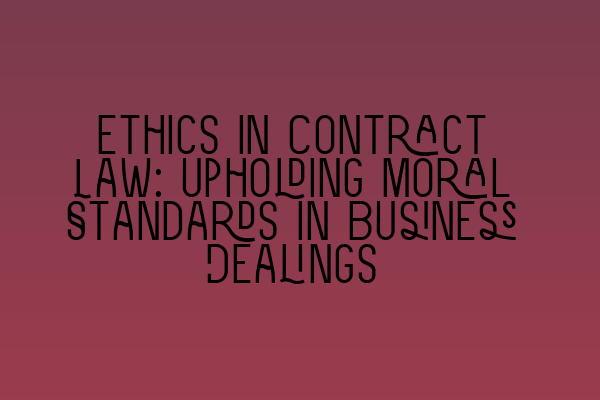In the complex world of contract law, ethical considerations play a crucial role in ensuring fair and just business dealings. Upholding moral standards is not only a reflection of an individual’s integrity and values but also essential for establishing trust and sustainability in any business relationship. In this blog post, we will navigate through the ethical aspects of contract law and the significance of upholding moral standards in business transactions.
Before delving into the intricacies of ethics in contract law, it is important to understand what ethics truly represents. Ethics encompasses a set of principles that guide individual conduct and decision-making. In the context of contract law, ethics dictates how parties involved should behave, negotiate, and honor their contractual commitments.
The Importance of Ethical Conduct in Contract Law
1. Relationship Building and Trust:
A contract is essentially an agreement between two or more parties, built on trust and confidence in the integrity of each party. Ethical conduct in contract law strengthens these relationships and fosters a sense of trust and dependability. Parties are more likely to engage in future business dealings when they have confidence in the ethical behavior and principles of their partners.
SQE Sample Papers: Practice for Exam Success
2. Legal Compliance:
Contracts exist within the framework of legal rules and regulations. Ethical conduct ensures that parties not only adhere to the terms of the contract but also comply with the applicable laws and regulations governing the transaction. By upholding ethical standards, businesses demonstrate their commitment to legal compliance, avoiding potential legal pitfalls and repercussions.
Adjusting Your SQE Strategy Based on Mock Performance
3. Fairness and Equity:
Ethics in contract law demand fair and equitable treatment of all parties involved. It ensures that negotiations are conducted with transparency, honesty, and without any undue influence or coercion. The principles of fairness and equity promote a level playing field and prevent exploitation or disadvantageous situations for any party.
Peer Discussions Post-Mock: Learning from Collaboration and Feedback
Key Ethical Considerations in Contract Law
1. Informed Consent:
Obtaining informed consent from all parties involved is a fundamental ethical principle in contract law. Each party must have a clear understanding of the terms, conditions, and implications of the contract before agreeing to it. Ensuring informed consent minimizes misunderstandings and creates a more binding and reliable agreement.
2. Honoring Commitments:
Once a contract is entered into, it is imperative that all parties adhere to the agreed-upon terms and fulfill their obligations. Honoring commitments demonstrates ethical behavior and builds trust between parties. Failure to fulfill obligations can not only lead to legal consequences but also tarnish a business’s reputation and credibility.
3. Confidentiality and Privacy:
Ethical conduct in contract law also includes protecting the confidentiality and privacy of the information shared between parties. Respect for confidentiality ensures that sensitive information remains secure, thereby fostering trust and preserving the integrity of the relationship.
Interactive Mock Tests for a Realistic SQE Experience
Enforcement and Consequences
While ethical conduct should be the moral compass guiding business dealings, there are times when parties may breach their ethical obligations. In such cases, legal remedies may be sought to enforce rights and hold the breaching party accountable. Breaching ethical standards can have significant consequences, both legally and reputationally.
Legal consequences may include remedies such as specific performance, damages, or even contract termination. Reputationally, breaches of ethics can damage a business’s standing in the market, leading to loss of clientele, partnerships, and overall trust within the industry.
Sharpen Your Skills with SQE Practice Questions
Incorporating Ethics into Contract Law
To ensure that ethical considerations are appropriately integrated into contract law, legal professionals must prioritize ethical conduct and compliance. This can be achieved through:
1. Ethical Training:
Law firms, organizations, and legal education institutes should provide comprehensive ethical training to aspiring lawyers and professionals practicing contract law. This training should focus on cultivating a strong moral compass and understanding the ethical nuances of different contractual scenarios.
2. Code of Ethics:
Legal professionals should adhere to a code of ethics specific to contract law to ensure consistent ethical behavior across the industry. A code of ethics can serve as a guiding framework, emphasizing the principles and values that govern contracts and business transactions.
3. Continuous Ethics Review:
Legal professionals should engage in continuous self-reflection and evaluation of their ethical conduct. Regular ethics reviews can help identify potential areas of improvement and ensure ongoing adherence to moral standards in contract law.
In conclusion, ethics in contract law are a cornerstone of fair and just business dealings. Upholding moral standards not only fosters trust and sustainability but also ensures legal compliance and equitable treatment for all parties involved. By prioritizing ethics, legal professionals can contribute to an ethical and transparent business environment, further strengthening the foundation of contract law.
